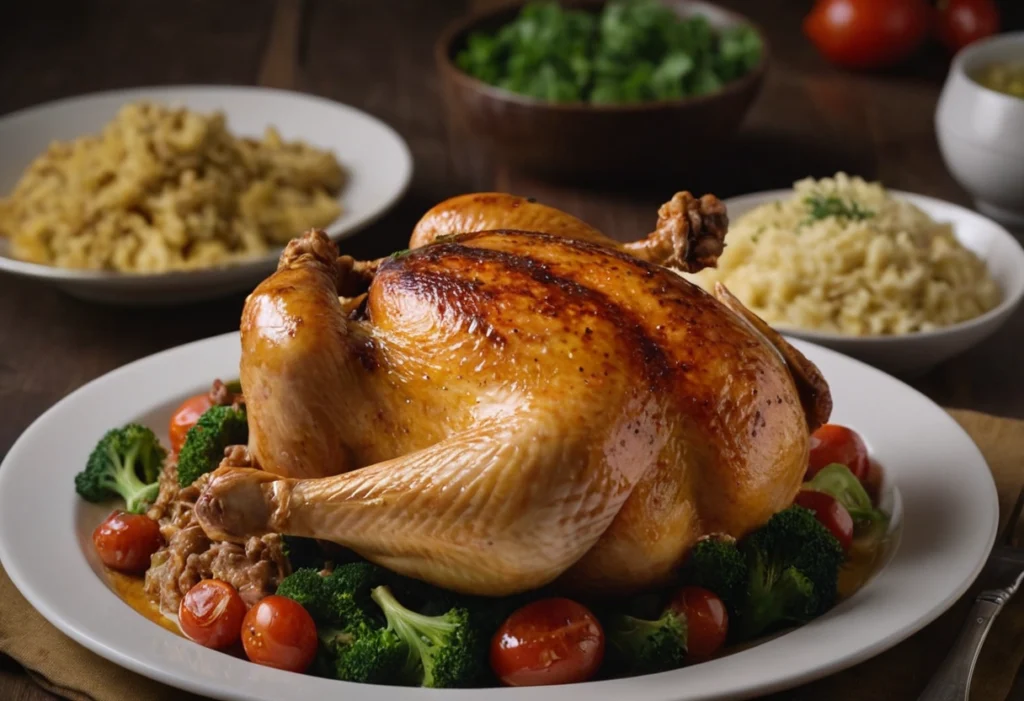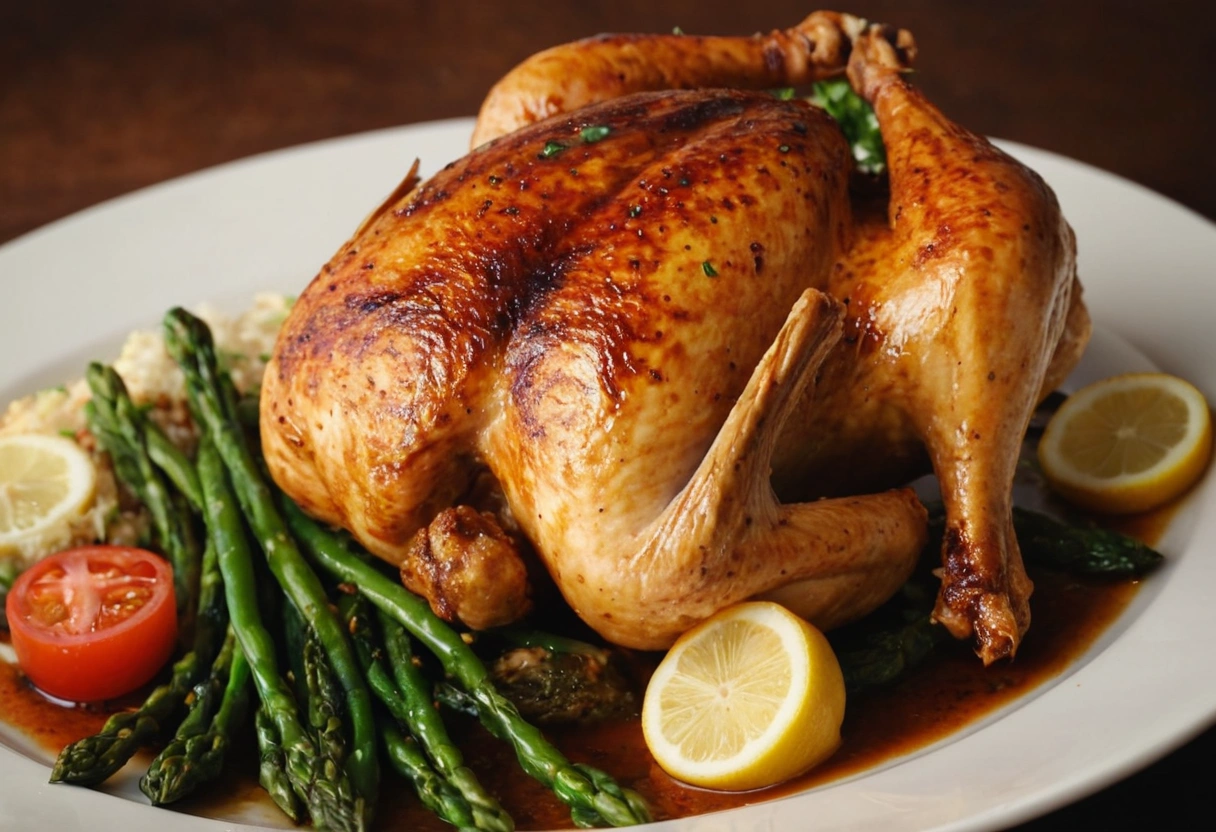Introduction to Halal Chicken
When discussing food practices in different cultures and religions,Halal meat, often arises as an important topic. But what exactly does Halal mean, and why does it matter? In Arabic, “Halal” means “permissible” or “lawful.” When it comes to food, especially meat, it refers to what Islamic law, as written in the Quran, allows.
Halal chicken is not just about the type of meat; it covers the entire process, from how the chicken is raised to how it is prepared. Understanding this process is crucial for anyone interested in the cultural, religious, or ethical aspects of Halal meat,
What Makes Chicken Halal?
For chicken to qualify as Halal, it must meet specific rules set by Islamic law, derived from the Quran and Hadith (sayings and practices of Prophet Muhammad). Here’s a breakdown of the essential elements:
Islamic Rules for Halal Meat
- The chicken must be alive and healthy at the time of slaughter.
- A Muslim who understands the practice must perform the slaughter.
- The slaughterer must invoke the name of Allah (God) during the slaughter, usually by saying “Bismillah” (“In the name of Allah”) followed by “Allahu Akbar” (“God is the greatest”).
- The slaughterer must fully drain the blood from the chicken.
The Role of the Quran and Hadith in Halal Practices
Islamic texts provide explicit instructions on what is permissible (Halal) and what is not (Haram). These guidelines ensure that the process aligns with Islamic principles and that it is conducted humanely and ethically.
Differences Between Halal and Non-Halal Chicken
The key difference betweenthe chicken and non-Halal meat, lies in the method of slaughter and the religious rituals involved. Non-Halal practices do not follow these specific requirements, making the meat impermissible for Muslims to consume.
The Process of Halal Slaughter (Zabihah)
The Zabihah process, or Halal slaughter, involves a meticulous practice aimed at minimizing the suffering of the animal. This method serves as both a religious obligation and a practice that emphasizes humane treatment of animals.
The Process: Step-by-Step
- The slaughterer positions the chicken to allow easy access to its throat.
- The slaughterer uses a sharp knife to make a quick, deep incision across the throat, cutting the windpipe, food pipe, and both jugular veins. This action ensures that the chicken loses consciousness quickly and suffers minimally.
- The slaughterer allows the blood to drain completely, which removes most toxins from the meat.
Key Steps for Halal Slaughter
- The knife must be extremely sharp to ensure a swift and humane cut.
- The slaughterer must be a Muslim who is mentally sound and of mature age.
- The slaughter must be carried out in a single, deliberate motion.
The Role of the Slaughterer (Dhabih) in the Process
The Dhabih, or slaughterer, plays a crucial role in ensuring the meat is Halal. This person must be knowledgeable in Islamic law, particularly the rules surrounding the slaughter of animals. The Dhabih‘s intentions and actions hold as much importance as the physical process of slaughter.
Ethical and Humane Treatment of Animals in Halal Slaughter
One of the core principles of Halal slaughter involves treating animals ethically. The process minimizes pain and suffering, aligning with the broader Islamic view that humans serve as stewards of the earth, responsible for treating all living creatures with compassion.
Halal Certification and Standards
Consumers who want to ensure their chicken is genuinely Halal should understand Halal certification. Certification provides assurance that the food product meets all Islamic law requirements.
The Importance of Halal Certification
- Halal certification allows Muslims to make informed choices about the products they consume.
- Certification builds trust between producers and consumers because the process involves rigorous and transparent criteria.
Major Halal Certification Bodies Around the World
Several organizations worldwide provide Halal certification, including:
- The Halal Food Authority (HFA) in the United Kingdom.
- The Islamic Food and Nutrition Council of America (IFANCA) in the United States.
- The Department of Islamic Development Malaysia (JAKIM).
These bodies enforce stringent criteria that food producers must follow to earn certification.
Understanding Labels: What to Look For
When shopping for Zabihah chicken, look for certifications from recognized bodies. The label should clearly state “Halal” and may include the certification body’s logo. Be cautious of products that claim to be Halal without proper certification, as they might not meet the standards.
Cultural and Religious Significance of Zabihah chicken
Halal food extends beyond a dietary choice for Muslims; it represents a significant aspect of their religious identity and cultural practices.
Halal Chicken in Islamic Culture
In Islamic culture, food is not just sustenance; it also serves as a means to spiritual purity and closeness to God. Consuming Zabihah chicken allows Muslims to fulfill their religious obligations and ensures that what they eat is clean and lawful.
The Role of Halal Chicken in Religious Traditions
Muslims often feature the chicken in religious observances, such as Eid al-Adha and Eid al-Fitr. These celebrations typically involve communal meals where Halal meat is shared among family, friends, and the less fortunate.
Comparison with Other Religious Dietary Laws
Islam’s Halal laws, like Judaism’s Kosher laws, dictate what is permissible for consumption. While both emphasize humane treatment of animals, key differences exist in the rituals and guidelines.
For a deeper understanding of Islamic Dietary Laws, explore resources that elaborate on the similarities and differences between Halal and other religious dietary practices.
Nutritional Benefits of Halal Chicken
Beyond its religious significance, Zabihah chicken often stands out as a healthier option due to the specific slaughtering process that removes toxins from the meat.
Nutritional Profile of Halal Chicken
- the chicken provides a rich source of protein, essential vitamins, and minerals.
- The thorough draining process removes blood and harmful substances, potentially making the meat cleaner.
Health Benefits of Eating Halal Chicken
- Many consider Halal chicken to be cleaner and more hygienic, reducing the risk of foodborne illnesses.
- The ethical and humane treatment of animals in the Halal process may lead to a better quality product by reducing stress hormones in the meat.
Comparison with Non-Zabihah chicken Nutritional Value
Studies suggest that HZabihah chicken may offer a slight edge in terms of purity and cleanliness, although the overall nutritional content is similar to non-Halal chicken. The primary difference lies in the spiritual and ethical aspects.
Halal Chicken vs Regular Chicken: What’s the Difference?
Many consumers wonder about the differences between Zabihah chicken and regular chicken, particularly regarding taste, quality, and ethical considerations.
Detailed Comparison: Halal vs Regular Chicken
- Slaughter Method: the chicken undergoes slaughter according to specific religious guidelines, while regular chicken may not follow such strict protocols.
- Ethical Standards: Halal practices prioritize humane treatment of animals, which may not always be the case in regular chicken processing.
- Religious Significance: For Muslims, consuming Halal chicken fulfills a religious obligation, while regular chicken does not have any such religious connection.
Consumer Views and Misconceptions
Several myths surround the chicken, including the belief that it tastes drastically different from regular chicken. However, many people notice little to no difference in taste, while the ethical and religious compliance provides peace of mind.
Impact on Taste and Quality
Some argue that the Halal slaughter process improves the taste and tenderness of the meat, while others believe the difference is minimal. The true value of Halal lies in its ethical and religious significance.
For more detailed insights into the Halal market and its growth, visit Global Halal Market Insights.
Global Market for Halal Chicken

The demand for Halal chicken is not limited to Muslim-majority countries; it is rapidly expanding worldwide.
Growth of the Halal Chicken Industry
The global Halal food market, including the chicken, is expected to grow significantly in the coming years, driven by increasing Muslim populations and growing awareness among non-Muslims about the benefits of Halal products.
Key Markets and Trends
- Middle East and North Africa (MENA): These regions represent the largest consumers of Halal chicken due to religious obligations.
- Asia-Pacific: This region shows growing interest from both Muslim and non-Muslim consumers.
- Europe and North America: These regions see rising demand due to a growing Muslim population and increased interest in ethical food practices.
Challenges and Opportunities in the Zabihah chicken Market
- Challenges: Producers face stringent certification processes and must maintain the authenticity of Halal products.
- Opportunities: Expanding markets in non-Muslim countries and the development of new Halal-certified products present significant growth opportunities.
the chicken in Different Cuisines
Halal chicken has influenced global cuisine, leading to a variety of dishes that are both delicious and compliant with Islamic law.
Popular Halal Chicken Dishes Worldwide
- Middle Eastern Cuisine: Shawarma, Kebabs, and Mandi.
- South Asian Cuisine: Chicken Biryani, Chicken Tikka, and Chicken Karahi.
- Southeast Asian Cuisine: Nasi Ayam (Chicken Rice), Satay, and Rendang.
Recipes and Cooking Tips
Cooking the chicken is not limited to traditional recipes. It can be incorporated into a wide range of global cuisines, making it a versatile ingredient. Techniques like marination, grilling, and slow cooking can enhance the flavors while maintaining its Halal integrity.
The Influence of Halal Chicken on Global Cuisine
The rise of Halal food trucks, restaurants, and supermarkets worldwide has made Halal chicken a staple in many non-Muslim households. The adaptability ofHalal meat to various cuisines highlights its growing popularity.
FAQs about Halal Chicken
What is the difference between halal and kosher chicken?
Both Halal and Kosher chickens are slaughtered according to religious guidelines, but the processes and rituals differ. Kosher laws are based on Jewish dietary laws, while Halal follows Islamic principles. For example, in Kosher, a trained rabbi usually performs the slaughter, while in Halal, a qualified Muslim slaughterer carries out the process.
Can non-Muslims eat halal chicken?
Yes, non-Muslims can eat Halal chicken. It is considered clean and permissible for all to consume. Many non-Muslims choose Halal meat for its ethical slaughtering practices.
Is halal chicken healthier than non-halal chicken?
The healthiness of Halal chicken compared to non-Halal chicken can be subjective. However, many believe that because Halal chicken undergoes a thorough blood-draining process, it is cleaner and may contain fewer impurities.
How can I be sure my chicken is halal?
To ensure your chicken is Halal, look for certification labels from recognized Halal certification bodies. Additionally, purchasing from reputable Halal butchers or supermarkets can provide assurance.
Are there any myths or misconceptions about halal chicken?
Common misconceptions include the belief that Halal chicken is inferior in taste or quality compared to regular chicken. In reality, Halal meat meets high ethical and religious standards, making it a preferred choice for many.
Conclusion
In conclusion, Zabihah chicken is not just a dietary requirement for Muslims; it represents a broader commitment to ethical, humane, and spiritually aligned food practices. The global demand for Halal meat continues to grow, driven by both religious adherence and a broader interest in ethical eating. Whether you’re a Muslim looking to ensure your food is religiously compliant or a non-Muslim interested in the benefits of Halal meat, understanding the principles and practices of Halal meat can help you make informed and conscientious choices.
By choosing Halal meat, you’re not just adhering to dietary laws; you’re participating in a tradition that values the humane treatment of animals, ethical food production, and spiritual purity. As more people become aware of these benefits, the demand for Halal chicken is likely to continue its upward trajectory, influencing global food markets and culinary practices.

